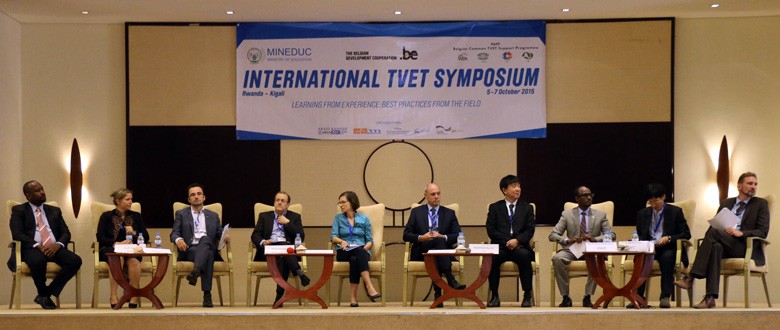
From the 5th till the 7th of October 2015, an international symposium on technical and vocational education and training (TVET) took place in Kigali, Rwanda. It was organised by the Ministry of Education of Rwanda, the Belgian Development Cooperation and the PAFP programme. This is the Belgian common TVET support programme, in which VVOB joins forces with the Belgian Development Agency and APEFE to improve the quality of the Rwandese TVET system. The symposium translated its five years of experience into recommendations for the Africa ministerial conference on TVET, which was held the day after the symposium.
'Learning from experience: best practices from the field'
The symposium was a joint-organisation of the Ministry of Education of Rwanda, the Belgian Development Cooperation and the PAFP Programme. Other Development partners were also implied: EDC-Akazi Kanoze USAID Youth Livelihood project, NUFFIC, GIZ-Eco-Emploi Programme, KOICA and JICA. Together they capitalised the results of the PAFP Programme. This programme started in 2010 under a single direction with a corporate budget of approximately ten million euros and runs till December 2015. During the symposium, best practices were presented and discussed, from the PAFP Programme, as well as from several other development partners in Rwanda. Over 200 participants from different African countries and well beyond were present.
Topics
VVOB’s head office was represented by Jan Fransen, who participated in the opening panel of the plenary session. He emphasised the results of VVOB in the field of school leadership in Rwanda and the importance of good school leaders for quality TVET. Furthermore the symposium consisted of 15 working sessions, with the purpose to learn from experience and best practices from the field, to identify lessons learnt and to give feedback in the form of policy recommendations. Members of the VVOB Rwanda team (among others Alexis Mukizwa Mahe, Christian Karasira, Gemma Musengeneza, Juma Byagatonda, Luc Buntu and Lucy Schalkwijk) focused in their working sessions on peer learning networks as a cost-effective way to build leadership skills and on the importance of school leadership and what was done in the PAFP programme to support school leadership and school management.
Other topics of the symposium were work-based learning experiences for TVET trainees, linking TVET with the informal sector and with the private sector, school-based production units for financial sustainability, bridging the gap towards competency-based training and assessment though training of trainers, entrepreneurship skills development and designing and implementing competency-based training.
Recommendations
PAFP is nearing its conclusion. The symposium was an ideal occasion to draw conclusions and formulate suggestions for future TVET projects inside and outside Rwanda. The recommendations of the symposium were discussed at the African Ministerial Conference on TVET (‘Partnership for youth employment through market relevant skills’) that took place on October 8th.
On-site learning
At the level of the school, the PAFP programme supported the transition to a competency-based approach in 24 pilot schools. One example of this new approach is the on-site learning; an effective way for TVET students to acquire practical knowledge.




